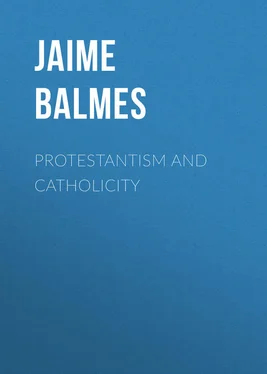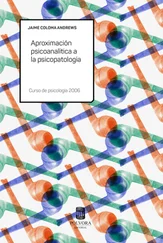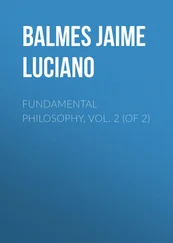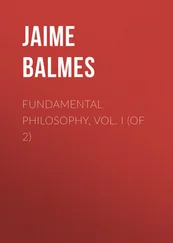Jaime Balmes - Protestantism and Catholicity
Здесь есть возможность читать онлайн «Jaime Balmes - Protestantism and Catholicity» — ознакомительный отрывок электронной книги совершенно бесплатно, а после прочтения отрывка купить полную версию. В некоторых случаях можно слушать аудио, скачать через торрент в формате fb2 и присутствует краткое содержание. Жанр: foreign_antique, foreign_prose, на английском языке. Описание произведения, (предисловие) а так же отзывы посетителей доступны на портале библиотеки ЛибКат.
- Название:Protestantism and Catholicity
- Автор:
- Жанр:
- Год:неизвестен
- ISBN:нет данных
- Рейтинг книги:3 / 5. Голосов: 1
-
Избранное:Добавить в избранное
- Отзывы:
-
Ваша оценка:
- 60
- 1
- 2
- 3
- 4
- 5
Protestantism and Catholicity: краткое содержание, описание и аннотация
Предлагаем к чтению аннотацию, описание, краткое содержание или предисловие (зависит от того, что написал сам автор книги «Protestantism and Catholicity»). Если вы не нашли необходимую информацию о книге — напишите в комментариях, мы постараемся отыскать её.
Protestantism and Catholicity — читать онлайн ознакомительный отрывок
Ниже представлен текст книги, разбитый по страницам. Система сохранения места последней прочитанной страницы, позволяет с удобством читать онлайн бесплатно книгу «Protestantism and Catholicity», без необходимости каждый раз заново искать на чём Вы остановились. Поставьте закладку, и сможете в любой момент перейти на страницу, на которой закончили чтение.
Интервал:
Закладка:
This distinguished ecclesiastic, the boast of the Spanish clergy and the Catalan people, died at Vich, his native city, on the 9th of July, 1848, in the same spirit of lively faith and fervent piety which had always marked his life. His funeral took place on the 11th, with all the pomp that could be furnished by the civil and ecclesiastical authorities. The municipality decreed that one of the public places should be named after him.
Balmes was little below the middle height, and of weak and slender frame. But the appearance of feeble health which he exhibited, was combatted by the animation of his looks. His forehead and lips bore the impress of energy, which was to be seen also in his eyes, black, deep-set, and of unusual brightness. The expression of his countenance was a mixture of vivacity, openness, melancholy and strength of mind. A careful observer of all his sacerdotal duties, he found in the practices of piety, the vigor which he displayed in his intellectual labors. The distribution of his time was extremely methodical, and his pleasures consisted only in the society of his friends. To the prospect of temporal honors and the favor of the great, he was insensible; neither did he seek after ecclesiastical dignities or literary distinctions. His aim was the diffusion of truth, not the acquisition of a great reputation. These qualities, however, with his eminent talents, varied erudition, and invaluable writings, have won for him a universal fame.
CHAPTER I.
NAME AND NATURE OF PROTESTANTISM
There is a fact in existence among civilized nations, very important on account of the nature of the things which it affects – a fact of transcendent importance, on account of the number, variety, and consequence of its influences – a fact extremely interesting, because it is connected with the principal events of modern history. This fact is Protestantism.
Like a clap of thunder, it attracted at once the attention of all Europe; on one side it spread alarm, and on the other excited the most lively sympathy: it grew so rapidly, that its adversaries had not time to strangle it in its cradle. Scarcely had it begun to exist, and already all hope of stopping, or even restraining it, was gone; when, emboldened by being treated with respect and consideration, it became every day more daring; if exasperated by rigour, it openly resisted measures of coercion, or redoubled and concentrated its forces, to make more vigorous attacks. Discussions, the profound investigations and scientific methods which were used in combating it, contributed to develop the spirit of inquiry, and served as vehicles to propagate its ideas.
By creating new and prevailing interests, it made itself powerful protectors; by throwing all the passions into a state of fury, it aroused them in its favor. It availed itself, by turns, of stratagem, force, seduction, or violence, according to the exigencies of times and circumstances. It attempted to make its way in all directions; either destroying impediments, or taking advantage of them, if they were capable of being turned to account.
When introduced into a country, it never rested until it had obtained guarantees for its continued existence; and it succeeded in doing so everywhere. After having obtained vast establishments in Europe – which it still retains – it was transported into other parts of the world, and infused into the veins of simple and unsuspecting nations.
In order to appreciate a fact at its just value, to embrace it in all its relations, and to distinguish properly between them, it is necessary to examine whether the constituting principle of the fact can be ascertained, or at least whether we can observe in its appearance any characteristic trait capable of revealing its inward nature. This examination is very difficult when we have to do with a fact of the kind and importance of that which now occupies our attention. In matters of this sort, numbers of opinions accumulate in the course of time, in favor of all which arguments have been sought. The inquirer, in the midst of so many and such various objects, is perplexed, disconcerted, and confounded; and if he wish to place himself in a more advantageous point of view, he finds the ground so covered with fragments, that he cannot make his way without risk of losing himself at every step.
The first glance which we give to Protestantism, whether we consider its actual condition, or whether we regard the various phases of its history, shows us that it is very difficult to find any thing constant in it, any thing which can be assigned as its constituent character. Uncertain in its opinions, it modifies them continually, and changes them in a thousand ways. Vague in its tendencies, and fluctuating in its desires, it attempts every form, and essays every road. It can never attain to a well-defined existence; and we see it every moment enter new paths, to lose itself in new labyrinths.
Catholic controversialists have pursued and assailed it in every way; ask them what has been the result? They will tell you that they had to contend with a new Proteus, which always escaped the fatal blow by changing its form. If you wish to assail the doctrines of Protestantism, you do not know where to direct your attacks, for they are unknown to you, and even to itself. On this side it is invulnerable, because it has no tangible body. Thus, no more powerful argument has ever been urged, than that of the immortal Bishop of Meaux – viz. "You change; and that which changes is not the truth." An argument much feared by Protestantism, and with justice; because all the various forms which are assumed to evade its force, only serve to strengthen it. How just is the expression of that great man! At the very title of his book, Protestantism must tremble: The History of the Variations! A history of variations must be a history of error. (See note Конец ознакомительного фрагмента. Текст предоставлен ООО «ЛитРес». Прочитайте эту книгу целиком, купив полную легальную версию на ЛитРес. Безопасно оплатить книгу можно банковской картой Visa, MasterCard, Maestro, со счета мобильного телефона, с платежного терминала, в салоне МТС или Связной, через PayPal, WebMoney, Яндекс.Деньги, QIWI Кошелек, бонусными картами или другим удобным Вам способом.
[1] at the end of the vol.)
These unceasing changes, which we ought not to be surprised at finding in Protestantism, because they essentially belong to it, show us that it is not in possession of the truth; they show us also, that its moving principle is not a principle of life, but an element of dissolution. It has been called upon, and up to this time in vain, to fix itself, and to present a compact and uniform body. How can that be fixed, which is, by its nature, kept floating about in the air? How can a solid body be formed of an element, the essential tendency of which is towards an incessant division of particles, by diminishing their reciprocal affinity, and increasing their repellent force?
It will easily be seen that I speak of the right of private judgment in matters of faith, whether it be looked upon as a matter of human reason alone, or as an individual inspiration from heaven.
If there be any thing constant in Protestantism, it is undoubtedly the substitution of private judgment for public and lawful authority. This is always found in union with it, and is, properly speaking, its fundamental principle: it is the only point of contact among the various Protestant sects, – the basis of their mutual resemblance. It is very remarkable that this exists, for the most part, unintentionally, and sometimes against their express wishes.
Читать дальшеИнтервал:
Закладка:
Похожие книги на «Protestantism and Catholicity»
Представляем Вашему вниманию похожие книги на «Protestantism and Catholicity» списком для выбора. Мы отобрали схожую по названию и смыслу литературу в надежде предоставить читателям больше вариантов отыскать новые, интересные, ещё непрочитанные произведения.
Обсуждение, отзывы о книге «Protestantism and Catholicity» и просто собственные мнения читателей. Оставьте ваши комментарии, напишите, что Вы думаете о произведении, его смысле или главных героях. Укажите что конкретно понравилось, а что нет, и почему Вы так считаете.












